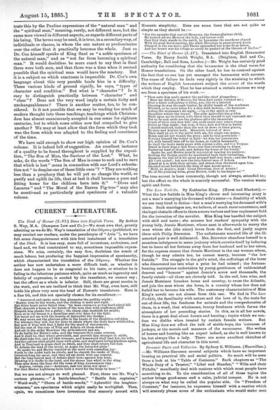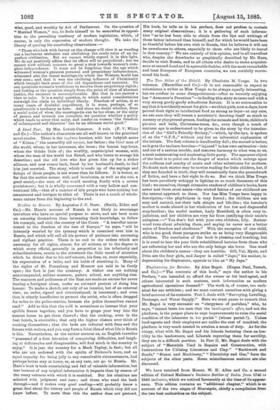Forensic Facts and Fallacies. By Sydney E. Williams. (Macmillan.) —Mr.
Williams discusses several subjects which have an important bearing on practical life and social polities. So much will be seen from a look at his "Table of Contents." Such chapters as "The Whole Daty of a Trustee," "Libel and Slander," " Wills and their Pitfalls," manifestly deal with matters with whioh most people have something to do. To the consideration of all of these topics the author brings good-sense and a calm, judicial temper. He is not always on what may be called the popular side. On "Freedom of Contract," for instance, he expresses himself with a caution which will scarcely please some of the enthusiasts who would make men wise, good, and wealthy by Act of Parliament. On the question of "Married Women," too, he feels himself to be somewhat in opposi- tion to the prevailing tendency of modern legislation, which, of course, ie only the expression of modern thought. We take the liberty of quoting his concluding observations :- " Those who look with favour on the change will view it as weeding out a barbarous archaism and abolishing the crude rules of an im- perfect civilisation. But we cannot wholly regard it in this light. We do not positively affirm that its effect will be prejudicial; but we cannot view without concern so great a step towards woman's com- plete independence. It must not be forgotten that the age which witnessed woman's greatest personal and proprietary independence, witnessed also the laxest marriage-tie which the Western world has ever seen; and that it was the civilising influence of Christianity which brought back some of the old dependence and restraint. No one questions woman's worthiness to receive these proprietary rights; and looking at the question simply from the point of view of abstract justice, the measure is unexceptionable. But that is too narrow a view to take. It is a social question, in which social considerations outweigh the claim to individual liberty. Freedom of action, in so many cases of doubtful expediency, is in none, perhaps, of so questionable a tendency as here. And since we doubt whether, from a social point of view, the marriage-tie can be too close, or the unity of person and interest too complete, we question whether a policy which tends to sever that unity, and confer on woman the freedom of unhampered self-direction' can be an ultimate social good."



































 Previous page
Previous page